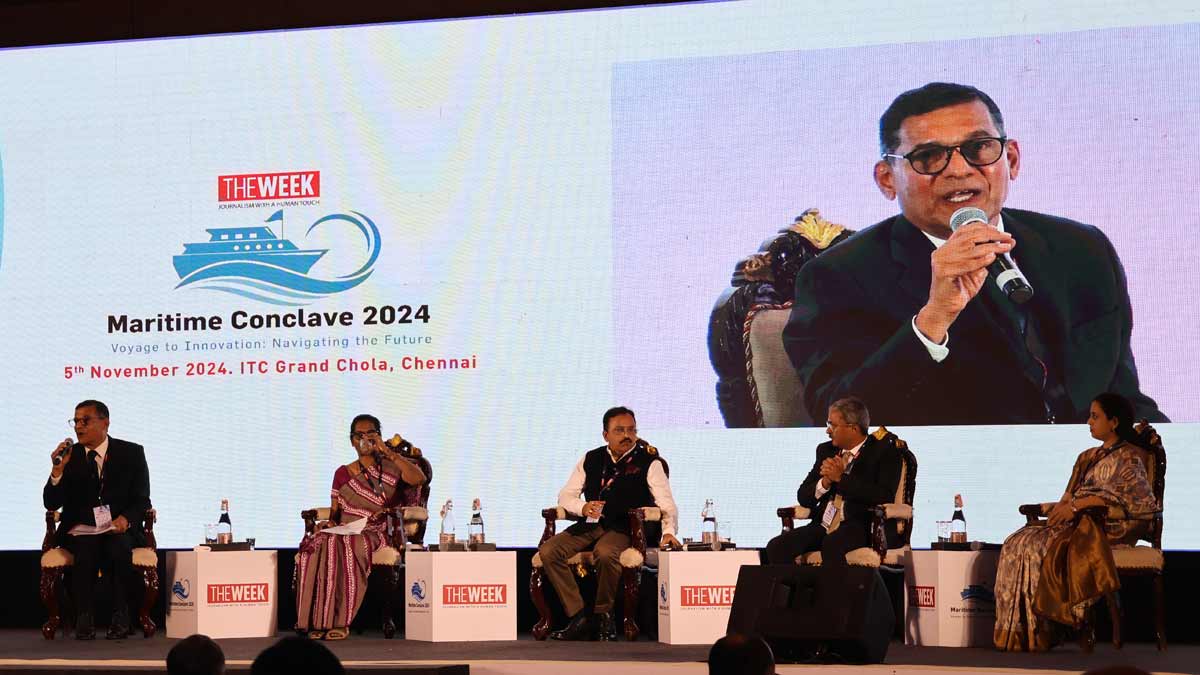While India may be lagging behind the world in terms of the number of ships, it has an ocean of opportunity ahead in making shipping more sustainable, said Umesh Sharad Wagh, chairman, Jawaharlal Nehru Port Authority, at THE WEEK Maritime Conclave 2024 in Chennai on Tuesday.
He was speaking at a panel discussion on 'Private Sector Role in India's 2047 Vision and the Government Support', which also had P.L. Haranadh, chairman, Paradip Port; J.P. Irene Cynthia IAS, managing director of Kamarajar Port Limited, and Arathi Narayanan, vice president, Women in Shipping and Trade Association, and director & CFO, ABS Marine Services Pvt, as the other participants.
The session was moderated by Captain John P. Menezes, chairman, Institute of Chartered Shipbuilders.
Wagh said that shipping companies are converting their existing fleet into green shipping and the ports are opting for the green shipping initiative, and this is an opportunity that the private sector players in India should not miss.
Speaking about last-mile connectivity, Haranadh said, by 2047, the east coast, comprising West Bengal and Odisha, is set to have one billion tonne cargo handling capacity. "The most important thing is that we have to create an ecosystem where the logistic cost is brought down, where the nearest port to the hinterland will be able to take care of the export or import requirements of the particular commodities."
Highlighting the importance of dry ports, he pointed out that these offer connectivity with the railways, roadways, and waterways; and hence it is important to improve the connectivity between the dry ports and the seaports to cut costs. The Sagaramala programme, which was initiated by the Union government in 2015, has done wonders in expanding the capacity of the ports, he added.
ALSO READ
- Have transformed India’s shoreline in last decade, says PM Narendra Modi
- Union fisheries ministry adjudges Kerala 'Best marine state', J&K 'Best UT'
- Green fuel, energy efficient measures and use of technology can help reduce carbon emissions in maritime sector: Experts
- THE WEEK Maritime Conclave 2024: 'The Haldia access channel will be a game changer', says Inland Waterways Authority chairman
- ‘Excavation of Lothal revealed port building capability of people of Indus Valley Civilization’
Ship-owning is a capital-intensive field, said Arathi Narayanan, and added that government support is required to incentivise ship-owning. "To build a future-ready vessel, we have to consider the various alternate fuels that are being considered. Much of R&D has gone into it, whether it would be methanol, hydrogen, ammonia, hydro, or batteries. It is difficult to invest in a fuel system that meets IMO (International Maritime Organisation) and national goals. While subsidies are provided to shipyards, such incentives and subsidies are not provided to the ship-owners."
She said that China offers 17 per cent subsidies to ship-owners in the country to build in Chinese yards, while Indian banks insist on collaterals apart from the ship. China also gives low-cost preferential loans to foreign buyers in Chinese yards. Incentives such as low-interest loans, longer repayment periods of 10-15 years, and a moratorium during the period of construction would be a good initiative for the private sector, Arathi Narayanan added.
"The Indian shipbuilding and ship repairs have been given the infrastructure status. However, shipping has not been given this status. If it is given this status, it will ensure long-term low-cost funding and refinancing."
Women in the maritime sector
Irene Cynthia noted that the number of women in the sector is extremely low, and this needs to change. "If you look at the global scenario, it is 1.2 per cent. India is slightly better at 2 per cent of the total seafaring community. But the scenario is not very good. Even out of the 1.2 per cent, if you look at very closely, 94 per cent are women who are in passenger ships."
She said maritime is an opaque sector and there needs to be more awareness about the sector to bring in more women participation. "If you can have ships crewed by women, at least 40 per cent, 50 per cent, any number, and you say, ok, this is the crew who is going to man this ship. And if you can have more and more number of ships, this is a starting point. We don't always have to be positively be partial towards women. But for a start, I think this can actually help more and more women enter the sector with confidence, with a safe ecosystem."
Cynthia highlighted the importance of having strict, but practical anti-harassment policies to ensure women feel safe at their workplace as it is a sector dominated by men.
"In October 2023, the government of India came up with a very nice circular – Guideline for Medical Evaluation of Transgender People for Admission to Maritime Courses. Now, this kind of gender-inclusive perspective is what we are looking at. These kind policies will slowly bring into the system the kind of positivity and movement we are looking at. Obviously, the most important point is perspective change; this won't happen in a day. But I think the process is already began and gradually we will have more women in the maritime sector."



